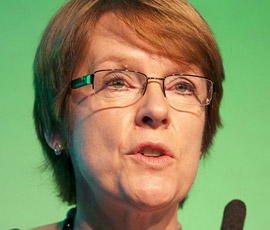DEFRA vows to re-write CAP greening plans

The government is set to re-write controversial plans for the so-called “greening” of the Common Agricultural Policy to make them fairer for UK farmers.
DEFRA secretary Caroline Spelman said European Commission proposals to green direct support (Pillar 1) payments were too rigid and did not go far enough to enhance the environment.
Speaking during an Environment, Food and Rural Affairs Committee evidence session on Tuesday (17 January), Mrs Spelman said she wanted greater CAP flexibility so member states could tailor environmental measures more effectively.
She said compulsory measures set out by European Commissioner Dacian Ciolos in October – which include introducing Ecological Focus Areas that would see 7% of land out of production – had “unintended consequences” for farmers across the EU.
“What is proposed lacks ambition, does not provide taxpayer with value for money and is too rigid. We will be pressing hard for much greater flexibility,” she told the cross-party group of MPs.
“Our concern is that in pursuit of a one-size-fits-all policy, crop diversification and permanent pasture have been identified as a key element of greening.
“In the UK, that’s not really new and we expect more of our farmers. That’s why we are call for stronger Pillar 2 as we are keen to promote meaningful measures.
“[The current plans would result in] unintended consequences, which in some areas would see high-quality pasture ploughed.
“We need to focus on the Ecological Focus Area definition and have flexibility so greening can be meaningful.”
Mrs Spelman said DEFRA scientists were drawing up an alternative menu of options that member states could chose from.
The options would be allocated points depending on their environmental worth to ensure equivalent measures were carried out across the EU and would be based around the Ecological Focus Area concept.
For UK farmers, that could mean taking land which was not necessarily highly productive but could be managed to protect the environment, such as hedgerows.
“Striking that balance is important,” she said.
Discussion around greening was still in its early stages, but more formal talks would be held next week to discuss the proposals, she added.
The UK had formed alliances with Germany, Scandinavia, Austria and some of the newer member states who wanted “more meaningful greening” and to be given flexibility.
It was hoped a deal could be struck so that UK farmers were recognised for the things they were doing well to protect the environment, she said.
